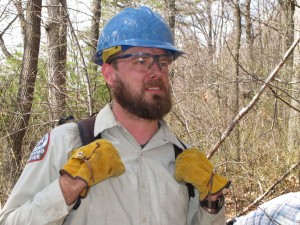MVP siting process has ignored our trails, scenic views and public attitudes
Commentary by Andrew Downs, Virginia Regional Director for the Appalachian Trail Conservancy, Roanoke Times, May 22, 2017
In less than seven weeks, the Federal Energy Regulatory Commission could give the nod to questionable plans Mountain Valley Pipeline has proposed. These plans have been rolled out in a way that prevents the public from adequately understanding the effect of major infrastructure on local communities and the world-famous Appalachian National Scenic Trail.
Like all pipeline proposals that traverse more than one state, Mountain Valley Pipeline is required to present a plan to FERC for public review and comment. FERC’s responsibility, in turn, is to evaluate the plan on need, safety considerations, community and environmental impacts, and other factors. FERC is also charged with addressing public concerns.
From the outset, when the company laid out plans to transport natural gas for more than 300 miles through Virginia and West Virginia, the problems with the routing were apparent and grievous because of inaccurate and incomplete information. What the company has since added to their plans is downright disrespectful to the legally-required public engagement and review process.
Therein lies the rub. Since September 2016, when MVP published its draft plan for a 90-day public review (which closed December 22) the company has added nearly 16,000 pages of additional information to their proposal. Sixteen thousand pages.
What all that added information means to the pipeline proposal is a mystery. The added information has not been entered in context, and there is little reference to what it all means. FERC can and should require the pipeline company to go back, sort out and integrate – not simply append – all the information it has added. That is essential to ensure good decisions and make certain that routing does not gravely damage private and public lands. Clear and accessible information about the impacts of this project is our public right.
The Appalachian Trail Conservancy strongly objects to MVP’s proposed route. The ATC’s mission is to ensure the Appalachian Trail and the scenic landscape that surrounds it is preserved and protected for generations to come. More than one-third of all Americans are within a day’s drive of the magnificent Appalachian range which draws all types of visitors – picnickers, campers, hunters and hikers – and contributes to the economic health of local rural communities such as Pearisburg and Narrows, as well as larger communities such as Roanoke and Blacksburg. As the Roanoke Valley has demonstrated, the outdoor-recreation assets of the region are a huge draw for new corporations and important to us.
The ATC finds that MVP’s proposed routing could not be worse. The route snakes through the Appalachians requiring thousands of acres of forest to be cleared and creating gashes the width of a 12-lane highway. The resulting eyesores would be devastating to the trail and surrounding landscape, and would be seen from as far as 20 miles away.
In 2015 the ATC spent considerable time outlining reasonable and workable criteria for energy companies to consider when locating proposed natural gas projects in the Appalachians. The MVP proposal seems to have not considered any of these guidelines.
In addition to the permanent damage to our views of the mountains and our recreation experiences, routing for the MVP crosses numerous waterways. An active seismic zone increases the possibility of natural gas leaks and contaminated groundwater. Proposed routing across steep mountainsides sets ups the certainty of landslides. Furthermore, routing requires the Forest Service to drastically alter a management plan supported by the public.
Thousands of people and communities such as Giles, Montgomery, Craig and Roanoke counties have expressed their serious concerns and objections to the proposed MVP. The ATC, the Roanoke Appalachian Trail Club, and many other stakeholders provided input on how the project could be adjusted to avoid unnecessary environmental hazards and unsightly alterations to Appalachian vistas — including building the pipeline alongside existing roads, highways and power lines. Unfortunately, advice from the ATC and many other stakeholders was ignored.
In light of this deeply insufficient process, no one individual nor entity – including FERC – could make a well-informed decision on this proposed pipeline. FERC has a responsibility to see that the public has access to information and that the process is sufficient.
The ATC invites your participation in requesting that FERC requires MVP submit a new document, a supplemental environmental impact statement, which puts more than 16,000 pages of information in context. When that new plan is submitted, we hope the company presents a plan that balances energy infrastructure needs with our mountain heritage, the preservation of our communities and the Appalachian Trail.
For more information about the MVP and the harmful effects to the Appalachian Trail, visit appalachiantrail.org/MVP.


{ 1 comment… read it below or add one }
From the Roanoke Times, May 22, 2017
I won’t argue with the gist of this article, that the routing of this proposed pipeline and the information put into public purview about it are unacceptable.
I just want to point out that given that 1–climate change is an imminent and extreme threat; 2–natural gas, when the full cycle is considered, is just as bad in greenhouse gas emission terms as coal.
Therefore, this project should be abandoned, so should the Atlantic Coast Pipeline and the Mountaineer Xpress and Gulf Xpress and Rover… ALL the proposed pipelines intended to replace the burning of coal with the burning of gas… to acknowledge that climate change is bearing down on us and threatens the health and even the survival of our children, and then go blithely on with new fossil fuel projects is criminally irresponsible and I would argue, flat out insane, since defense of the next generation is basic to healthy life.
Mary Wildfire, Charleston, West Virginia